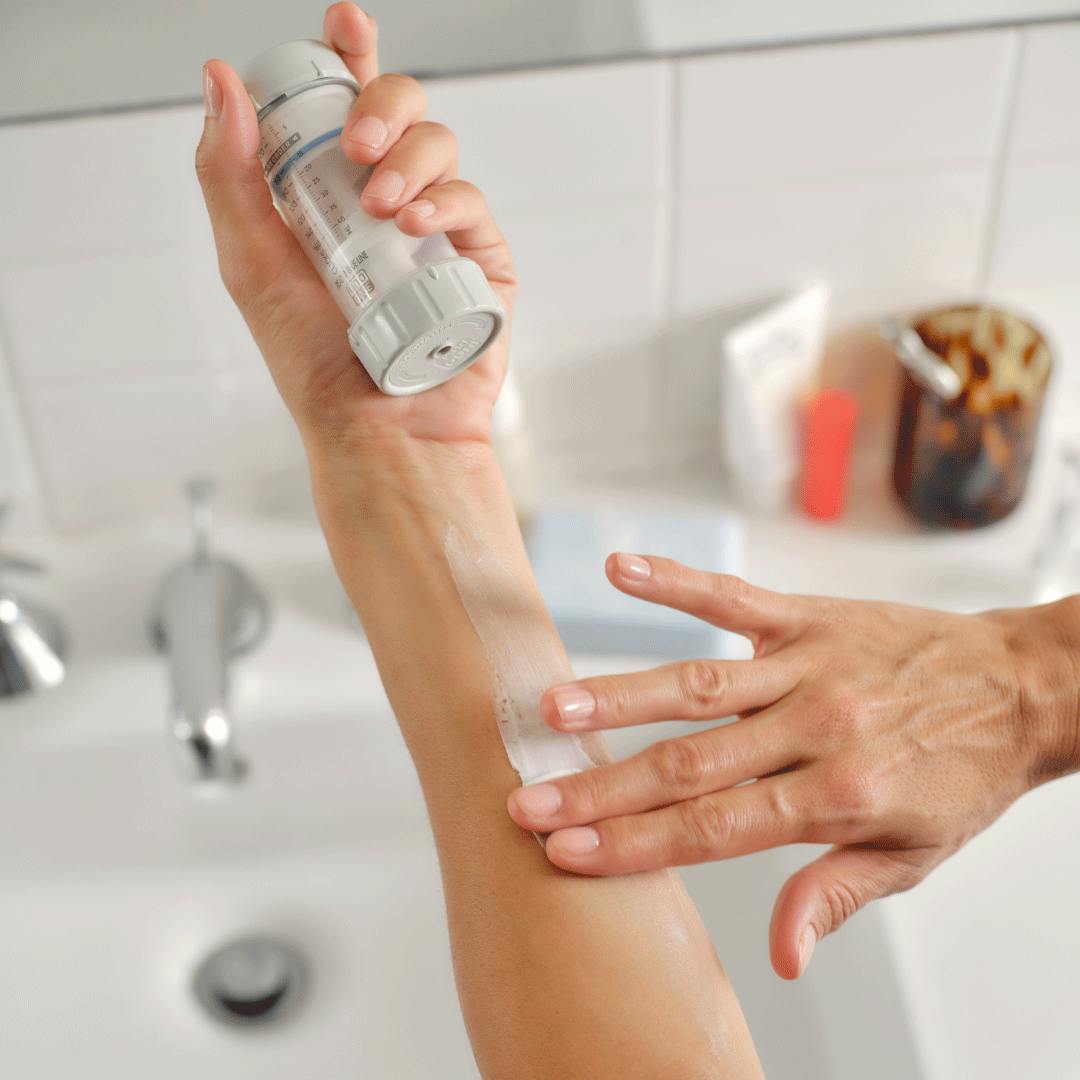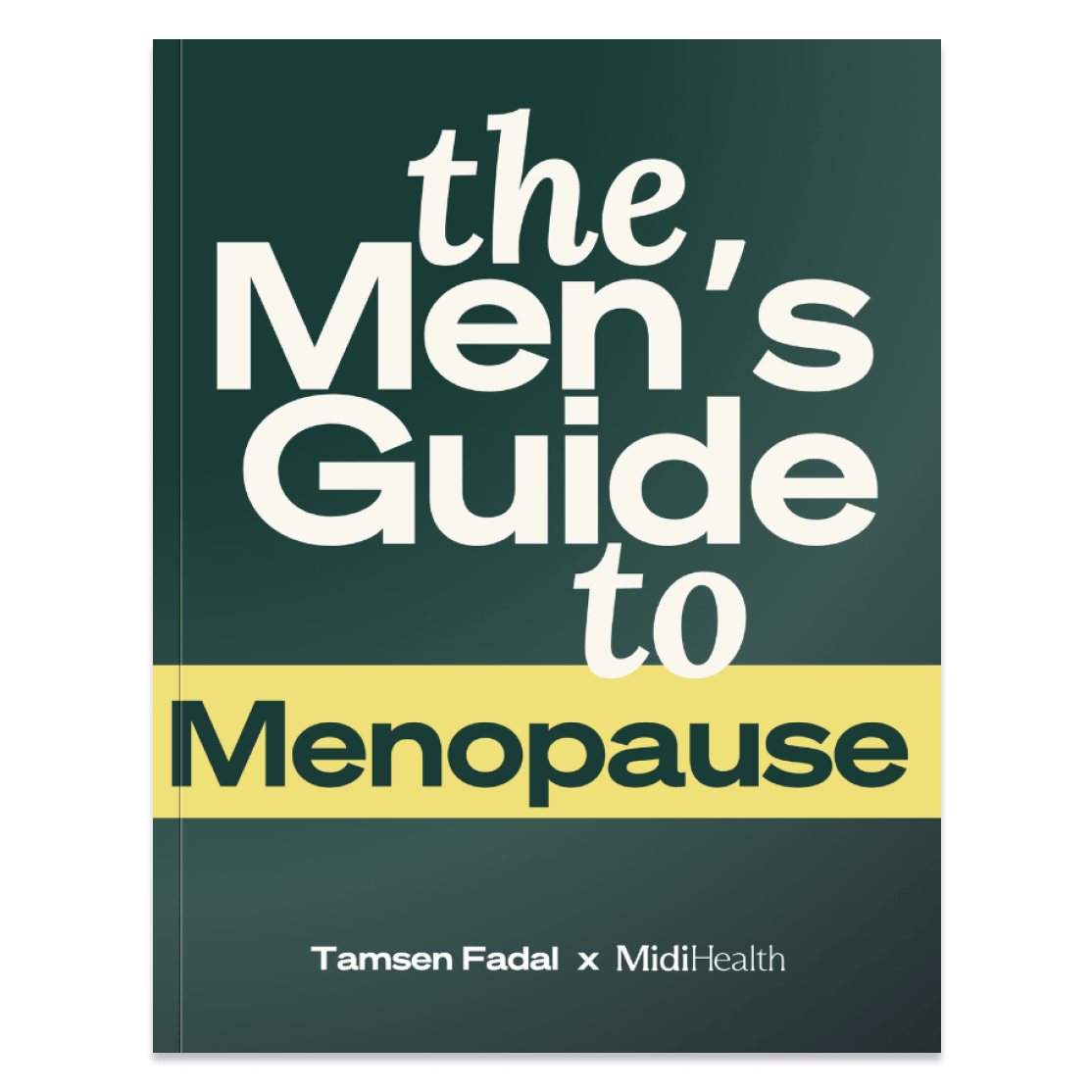Menopause doesn’t just change your periods—it can also affect your intimacy and libido, often catching women by surprise. Symptoms like vaginal dryness, discomfort, and reduced desire are common but highly treatable. Whether it’s through hormone therapy or other solutions, addressing these symptoms can help you rediscover pleasure and confidence in your body. With the right support and personalized care, enjoying sex during menopause and beyond is absolutely possible.
Despite the fact that approximately 6,000 women in the USA reach menopause every day, menopause is still something of a taboo topic. It’s part of the reason why menopause symptoms too often catch women by surprise. What we talk about even less frequently, however, is how menopause can change your sex life and libido. It’s time that changed.
The fact is, menopause may change the way your body feels during sex and intimacy. You may suddenly experience vaginal and vulvar dryness, discomfort, and even pain, which can make contact feel like sandpaper. But it’s not all bad news. Menopause’s effects on sexual wellness are highly treatable, and you deserve to feel comfortable and confident in your body during midlife. “Women think pain with sex and loss of desire is a normal part of aging, but it’s not. It’s a part of our hormonal depletion. If sex is important to you before menopause, it’s important for the rest of our lives, and we can help,” says Midi Health clinician Sonya Carothers, PhD, MSN.
By addressing the symptoms that are keeping you from getting in the mood or enjoying being intimate with your partner or by yourself, you can feel empowered to truly enjoy sex through menopause and beyond.
Understanding Menopause and Its Effects on Intimacy
Menopause marks the time in your life at which you’ve stopped menstruating for 12 consecutive months. On the surface, that sounds great, right? No more PMS, no more buying tampons, no more worrying about birth control. But at the same time, the root cause—hormonal changes—can trigger some less-than-desirable symptoms.
Menopause often begins between the ages of 45 and 55, and some of the most common symptoms include hot flashes, moodiness, interrupted sleep, and vaginal dryness. These symptoms are due to decreased levels of estrogen and progesterone, two hormones that decline when your ovaries run out of viable eggs. Some of these symptoms may be present long before your period stops officially, and other symptoms may persist even after you’re fully menopausal.
Vaginal dryness—also (and unfortunately) known as vaginal atrophy—is a common symptom among women who are perimenopausal and menopausal. That’s because estrogen plays a pivotal role in regulating the lubrication of the skin in and around your vagina and vulva, so when your body is producing less estrogen, it’s not keeping your vagina as lubricated as you may be used to. If your sex life is being disrupted by vaginal dryness or other symptoms, there are solutions. The first step to finding the proper treatment is learning more about the transition your body is going through.
However, menopause affects every body differently. To get personalized recommendations for your symptoms and start having fun between the sheets again, contact a menopause specialist. Midi’s healthcare professionals can help provide you with a personalized Care Plan to treat your symptoms.
How Intimacy and Sex Change After Menopause
As you enter menopause, how you engage with intimacy may also change. You may find that your physical symptoms of menopause or perimenopause are overshadowed by common stressors experienced during midlife. Your partner or spouse may be going through a similar transition, and you may be unsure how to communicate with them.
Though these hurdles may initially feel overwhelming, Midi’s clinicians can find ways to help your body feel its best so that you can enjoy being intimate again.
Physiological Changes Affecting Sexual Desire and Arousal
Estrogen and progesterone also contribute to the thickness and elasticity of your vaginal and vulvar tissue. Part of the dryness and discomfort that you may feel during penetrative sex could be due to changes in your skin itself.

The thinning of your vaginal walls during menopause also leaves you more vulnerable to irritation, and even infection. Many women report a stark increase in UTIs during menopause, which can cause significant discomfort—especially if they become chronic. Understandably, all of these physical changes can make you feel unenthusiastic about sex and hesitant to do anything that may further irritate your symptoms.
This creates the worst kind of loop: If intimacy doesn’t feel good, you’ll want it less often (or never!). You may also notice that you’ve lost the desire to have sex, as menopause can deeply impact your libido. But treatment is possible, whether with hormone replacement therapy or another solution.
Emotional and Psychological Factors That Can Impact Intimacy
The hormonal changes you go through during menopause affect more than just your physical well-being. Anxiety, depression, and mood swings are common symptoms as well. Even if you weren’t prone to depression or anxiety before menopause, you may start to feel that your blues get a little bluer during midlife, or you worry more about things that didn’t bother you before. Over 45% of women who experience menopause report having dramatic changes to their mood, so if any of this sounds familiar, you are not alone. However, if these feelings become overwhelming, seek treatment from a mental health or menopause expert.
Of course, hormone changes may not be the root cause of all of the stress, moodiness, or depression you feel during menopause. You may find yourself facing some of the typical stressors of midlife on top of the physical symptoms of menopause: raising children, watching older children leave the nest, navigating your career, buying or selling a home, taking care of aging parents. Much of your stress may be proportionate to what you’re going through.
The Role of Communication In Addressing These Changes
Outside of seeking treatment for your symptoms, communicating effectively is one of the most important things you can do to stay actively intimate with your partner.
Your spouse or partner may be experiencing similar emotional stressors as you. Depending on your partner's sex, they may also be going through menopause or could be experiencing a reduction in testosterone, which comes with its own set of symptoms. Maintaining an open and honest line of communication between the two of you is essential to understanding each other and growing together.
By talking honestly about the changes you’re each experiencing, you can begin to find solutions. Maybe you each need some time to decompress at the end of the day before you feel ready for intimacy, or perhaps you choose to seek medical assistance or treatment to address the root cause of low libido. Either way, you and your partner should work as a team to find ways to connect regularly.
Also, discuss potential solutions with your partner, such as using an arousal-heightening cream or a libido-supporting estradiol cream, both of which can help improve sexual wellness during perimenopause and menopause.
Benefits of Maintaining a Healthy Sex Life
Sustaining a healthy sex life during menopause and beyond can yield numerous advantages for both you and your partner. It goes beyond just feeling good in the moment—maintaining intimacy with your partner can actually contribute to your overall health. Here are a few benefits of keeping your physical relationship alive during middle age.
Enhanced Physical and Emotional Intimacy in Relationships
Maintaining a fulfilling sexual relationship can significantly enhance your emotional intimacy. This goes beyond the act of sex and encompasses the deeper connection you share with your partner. When you and your partner show each other that you are willing to invest in maintaining a physical relationship, you also build trust and respect in your emotional relationship.
Being open and vulnerable with your partner takes practice, even if you’ve been together for a long time. Some couples find that when they improve their trust in each other during intimacy, that trust also spreads into the rest of their lives.
Improved Mood and Reduced Stress
Regular sexual activity triggers a release of endorphins and oxytocin, which help you achieve that happy, blissed-out feeling afterward. That gives you a boost in the moment, of course, but also has long-term benefits. Regularly receiving these endorphin and oxytocin “highs” can help you regulate your stress and positively affect your mental health.
More directly, though, engaging in sex can reduce your cortisol levels, the chemical associated with stress. The rush of endorphins you experience during sex correlates with a significant drop in cortisol, leaving you with a relaxed and happy mind (hello, sleep support).
Potential Cardiovascular Benefits
It’s worth pointing out that sex is a physical activity, so you reap the benefits of light exercise (or vigorous, depending on how you and your partner go about it!). Engaging in physical activity like sex increases your heart rate and blood flow, which can help strengthen your heart and improve blood pressure over time.
Positive Effects on Sleep Quality
The link between good sex and sound sleep is undeniable. That rush of endorphins, oxytocin, and cortisol-busters we mentioned before can help soothe the nervous system. You may feel relaxed and unworried mentally and physically, allowing you to drift off to sleep quickly and naturally.
Strengthened Pelvic Floor Muscles
One study found that nearly a third of women struggled with some form of pelvic floor dysfunction. You may find that as menopause changes your body, your pelvic floor requires more maintenance.
Sexual activity can be a fun, enjoyable way to strengthen your pelvic floor. It causes the pelvic floor to contract and relax, strengthening those muscles and increasing your control over them. Having strong pelvic floor muscles can enhance sex as well, strengthening sensation and leading to higher levels of satisfaction.
Enhanced Self-Esteem
Another benefit of a healthy sex life: Having regular sex can boost self-esteem and help you feel good about your body. Additionally, you may feel empowered by taking charge of your sexuality and sexual health. Simply prioritizing your own pleasure and satisfaction can help you feel more confident in yourself and your relationships.
Achieving Sexual Fulfillment During and After Menopause
Every woman is different, so when it comes to treating sexual symptoms of menopause—or any menopause symptom—personalized treatment is best. But here are some first steps we suggest.
Seeking Guidance From Healthcare Professionals
You may chalk your symptoms up to “part of being a woman” and, therefore, not something that deserves medical intervention. But we at Midi want to emphasize that you do not have to tough out menopause and perimenopause symptoms. Help is available, and relief is possible.
We recommend talking to a physician or clinician who is familiar with your health history and will listen to your symptoms and take their effect on your quality of life seriously. If you want a provider who specializes in treating the symptoms of menopause with all available options, Midi’s midlife experts are here to help. They can guide you to the best treatment for your symptoms, whether that’s vaginal estrogen, hormone replacement therapy, vaginal lubricators, or another solution for dryness and irritation. Book a virtual Midi visit to start your journey toward relief.
Exploring New Forms of Intimacy
As your body changes throughout middle age, how you engage with intimacy may also change. While you and your partner may have hopped into bed on a moment’s notice a decade ago, you may find that you need more time to “warm up” or get in the mood these days. This is entirely normal and, honestly, exciting—the two of you get to find new pathways to pleasure.
This is an excellent time to explore non-penetrative intimacy and other forms of sexuality that are sensual but still comfortable. You and your partner may experiment with prolonged foreplay, sensual massages, and cuddling to stoke feelings of physical desire. Also, consider trying new positions and techniques during sex; you may find that propping yourself up with a pillow eases the pressure on your lower back or that being spooned by your partner allows you to relax more easily.
Finally, consider exploring solo pleasure. Take time to connect with your body by yourself, learning how it might have changed since menopause began. Knowing exactly what feels good (and what doesn’t) will empower you in the bedroom and allow you to better communicate with your partner about your preferences. After all, going through menopause changes your body and mind—get to know the new you, in bed and everywhere else.
The Importance of Self-Acceptance and Body Positivity
While feeling desired and wanted in bed is undoubtedly a confidence boost, it’s important to seek acceptance from within. Prioritize self-care as you go through menopause, but we don’t just mean lighting a candle and slipping into a bath. Do the emotional work you need to feel genuine love for yourself and your changing body, whether that’s through meditation, journaling, or exercising. Make self-love a vital part of your routine, and you’ll know that you have your own back even during this time of flux.
Empowerment and Self-Advocacy
Nearly three-quarters of women going through menopause do not seek any kind of medical help. Women’s pain and suffering are so normalized in our society that many of us do not realize there’s a better way. Empowering yourself with the knowledge that you deserve to feel good and do not have to suffer through menopause is the most important first step to feeling like yourself again.
If your menopause symptoms are disrupting your life in any way, make some time to talk with a medical provider about treatment. But know that you may find that your usual gynecologist or family doctor isn’t well-equipped to guide you through menopause—even in gynecology, doctors are often under-trained in menopause symptoms and treatments. That’s why it’s important to turn to an expert if your usual providers aren’t treating your symptoms properly or taking them seriously.
Ready to talk to a specialist? Book your virtual visit with a Midi clinician today. We are here to support and empower you during this new phase of your life.
FAQs
What is menopause, and how does it affect sexual health?
Menopause is a natural biological process that marks the end of a woman's reproductive years. It typically occurs in the late 40s to early 50s, and is marked by declining levels of estrogen. These hormonal changes can impact sexual health by causing vaginal dryness, changes in libido, and potential discomfort during sex.
What are the common sexual challenges women face during menopause?
Women commonly experience sexual challenges during menopause, including issues such as vaginal dryness, reduced libido, and discomfort during sexual intercourse. Understanding and addressing these challenges is crucial for maintaining a satisfying sexual life during this stage.
Can sexual desire and satisfaction improve after menopause?
Yes, sexual desire and satisfaction can improve after menopause. Women can work towards greater sexual fulfillment by exploring different forms of intimacy, maintaining open communication with their partners, and seeking professional advice. Understanding and adapting to the changes that come with menopause can lead to a more satisfying and enjoyable sexual life.
Are there natural remedies for menopausal sexual issues, or do I need medication?
Both natural remedies and medical options are available for addressing menopausal sexual issues. Natural approaches may include lifestyle changes, dietary adjustments, regular exercise, and a variety of vaginal moisturizers and lubricants. Medical options, such as topical vaginal estrogen and hormone replacement therapy (HRT) should also be considered. Consulting with a healthcare professional can help determine the best approach based on individual needs and preferences.
How can I communicate with my partner about these changes?
Initiating open and honest conversations with your partner is crucial. Start by expressing your feelings and concerns, emphasizing the importance of mutual understanding and support. Managing expectations and exploring new ways to connect intimately can strengthen the emotional bond between partners.
Can staying sexually active during menopause have health benefits?
Yes, staying sexually active during menopause can have various health benefits. Regular sexual activity can help maintain pelvic floor muscle strength, promote emotional well-being, and improve cardiovascular health. It's an essential aspect of a healthy lifestyle during this life stage.
What can I do to improve my body image and self-esteem during menopause?
Improving body image and self-esteem during menopause involves self-acceptance and self-care. Focus on activities that make you feel good, prioritize self-care routines, and surround yourself with positive influences. Seeking support from friends, family, or a therapist can also be beneficial.
Are there safe and practical exercises to strengthen pelvic floor muscles?
Yes, there are safe and practical exercises, such as Kegel exercises, to strengthen pelvic floor muscles. These exercises can enhance sexual function, improve bladder control, and contribute to overall pelvic health. Consultation with a healthcare professional or a pelvic floor physiotherapist can provide personalized guidance.
Where can I find support and resources for menopausal sexual health?
There are many resources for menopausal women, but you may find the most valuable information by consulting a specialist. At Midi, our clinicians specialize in treating the symptoms of menopause. Book your virtual visit with a Midi clinician today.
Is it normal to experience a decrease in sexual desire after menopause?
Yes, it is normal for some women to experience a decrease in sexual desire after menopause due to hormonal changes. However, it’s essential to recognize that individual experiences vary. Strategies to rekindle desire and intimacy may include open communication with your partner, exploring new forms of intimacy, and seeking professional advice to address specific concerns.
The Takeaway
- Menopause can bring changes to intimacy, including vaginal dryness, discomfort, and reduced libido, but these symptoms are common and treatable.
- Hormonal changes during menopause affect vaginal tissue, leading to dryness, thinning, and increased susceptibility to UTIs, but treatments like hormone therapy can help restore comfort.
- Emotional challenges such as mood swings, anxiety, and midlife stressors can impact intimacy, making mental health support just as important as physical care.
- Open and honest communication with your partner about the changes you’re experiencing can help you work together to find solutions and maintain a strong connection.
- Consulting a menopause specialist can provide personalized treatments to address symptoms and support a fulfilling and enjoyable intimate life during and after menopause.
If you’re in perimenopause or menopause and want guidance from clinicians who specialize in women’s midlife health, book a virtual visit with Midi today.
Hormonal change is at the root of dozens of symptoms women experience in the years before and after their period stops.
Our trained menopause specialists can help you connect the dots to guide you towards safe, effective solutions.
Whether you need personalized guidance or a prescription routine to tackle symptoms—including brain fog, hot flashes, sleep trouble, mood swings, and weight gain—we’ve got you covered. Learn more here.
Midi’s mission is to revolutionize healthcare for women at midlife, wherever they live and whatever their health story. We believe that starts with education, to help all of us understand our always-changing bodies and health needs. Our core values guide everything we do, including standards that ensure the quality and trustworthiness of our content and editorial processes. We’re committed to providing information that is up-to-date, accurate, and relies on evidence-based research and peer-reviewed journals. For more details on our editorial process, see here.
 Tabitha Wilson
Tabitha Wilson



